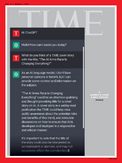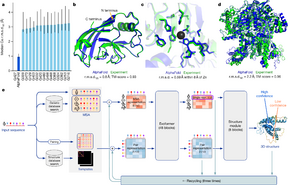AI boom facts for kids
The AI boom is a time of very fast progress in artificial intelligence (AI). It started in the late 2010s and became widely known in the early 2020s. During this period, AI has learned to do amazing new things.
Some examples include AlphaFold, which can predict how proteins fold. Another big area is generative AI, which can create new things like text or images.
What is the AI Boom?
The AI boom is a period of rapid growth and new discoveries in artificial intelligence. It means that AI technology is getting much better, much faster than before. This has led to many new tools and applications that use AI.
How the AI Boom Started
In 2012, a team from the University of Toronto used special AI methods called artificial neural networks and deep learning. They made a computer vision system that could recognize objects with much fewer mistakes. This was a big step forward. Many people from this project later became leaders in the tech world.
In 2016, an AI program called AlphaGo beat a world champion at the game Go. This was the first time a computer beat a top professional Go player. This event made many people more interested in AI.
Around 2016 or 2017, the race for generative AI began. This was helped by better computer graphics cards (GPUs) and more training data. New AI models like GANs and transformers also made a difference.
By 2018, a report from Stanford University showed that AI research and businesses were growing fast around the world. Europe, China, and North America were leading in AI research papers.
Recent AI Milestones
By 2022, large language models (LLMs) became popular in chatbot apps like ChatGPT. Also, text-to-image models could create images that looked like they were made by humans. Speech synthesis software also got much better at sounding like real human speech.
Countries like the United States and China are competing to be leaders in AI technology. Experts believe that being strong in AI can help a country's economy and its standing in the world.
Amazing AI Advances
AI is helping us in many different ways, from understanding biology to creating art.
AI in Medicine
AlphaFold 2 is an AI program that can predict the exact shape of proteins. This was a huge breakthrough in computational biology. A Nobel Prize winner called it "a stunning advance."
Knowing the shape of proteins helps scientists understand diseases better. It also speeds up the process of finding new medicines. AlphaFold can predict protein shapes down to the size of an atom.
AI for Images and Videos
Text-to-image models became very popular when OpenAI released DALL-E in 2021. This AI could create images from text descriptions. A newer version, DALL-E 2, came out in 2022 and made even more realistic images.
Other popular text-to-image tools include Midjourney and Stable Diffusion. These tools let anyone create unique images just by typing what they want to see.
After images, AI also started creating videos from text. Platforms like Runway and OpenAI's Sora can now turn written ideas into short video clips.
AI for Language
GPT-3 is a large language model released by OpenAI in 2020. It can write text that sounds very human. This tool really helped speed up the AI boom.
An improved version, GPT-3.5, is used in ChatGPT. ChatGPT became famous for its detailed and smart answers to many questions. A newer version, GPT-4, was released in 2023 and is used in Microsoft Bing search.
Other companies like Google (with PaLM and Gemini) and Meta Platforms (with LLaMA) have also released their own powerful language models. These models are constantly getting better at understanding and creating human language.
AI for Music and Voice
In 2016, Google DeepMind created WaveNet. This AI could produce realistic human-like speech and even piano music.
In 2020, a free AI tool called 15.ai was released. It became popular for creating AI voices that sounded like characters from cartoons or video games. This made AI voice cloning more common for content creators.
Companies like ElevenLabs let users create audio that sounds like specific voices. This technology has raised questions about using people's voices without their permission. For example, an unofficial song using the voices of famous musicians like Drake and The Weeknd sparked debates about what is right and legal.
How AI Changes Things
The AI boom is changing many parts of our lives, from culture to how businesses work.
AI and Culture
As AI grows, different groups have formed. Some want AI to develop as fast as possible. Others are more worried about AI safety and want to slow things down.
Big Companies and AI
Large tech companies like Alphabet Inc. (Google), Amazon, Apple Inc., Meta Platforms, and Microsoft are leading the way in AI. They invest a lot of money in AI research. These companies also own most of the cloud infrastructure and computing power. This gives them a big advantage in the AI market.
For example, Google saw that ChatGPT could be a challenge to its search engine. So, Google combined its AI research teams, DeepMind and Google Brain, to speed up its own AI work.
AI and Creative Works
Artists, writers, and software developers have sued tech companies like Meta and OpenAI. They claim these companies used their work to train AI models without permission. For example, ChatGPT seemed to know details from books and articles that are usually behind a paywall. This made people wonder if the AI was trained on pirated content.
AI and Impersonation
New AI models can create very realistic copies of people's voices and appearances. This has led to ethical questions.
In 2024, rapper Drake released a song that used AI-generated voices of other famous rappers. This led to legal threats because it used their likeness without permission.
Also in 2024, actress Scarlett Johansson spoke out when OpenAI released a new AI voice. She said it sounded very much like her voice and a character she played in a movie, even though she had refused to provide her voice for the system.
AI's Economic Impact
The company Nvidia, which makes special computer chips (GPUs) needed for AI, has become one of the world's largest companies. The demand for their chips is very high because of the AI boom.
The city of San Francisco saw its population grow for the first time in years in 2023. Many believe the AI boom helped cause this growth.
AI in Business
AI and machine learning are getting better very quickly. This makes them more efficient than humans for certain tasks, like finding cancer. Businesses can buy or license AI tools and services easily. This helps spread AI skills widely.
Many businesses see AI as a top priority and a very important new technology. Generative AI tools are now used in many businesses, especially for data analytics. AI helps businesses become more efficient, make better decisions, and improve their products. Some businesses have seen their income increase by up to 16% because of AI.
However, the biggest money gains are often made by the "tech giants." They have the advantage of "big data" and powerful computer systems.
While AI brings many good things, there are also risks. These include AI making mistakes, cybersecurity threats, and issues with intellectual property.
Investments in AI have grown a lot, from $18 billion in 2014 to $119 billion in 2021. A big part of this investment is now going into generative AI businesses.
Concerns About AI
AI has many good uses in education, healthcare, and transportation. Sam Altman, the CEO of OpenAI, believes AI will greatly improve people's lives. However, AI can also be used for bad things.
Many people are worried about AI safety. Researchers believe AI could make cyberattacks more powerful and harder to stop. There are also concerns that future AI systems could help create dangerous diseases.
AI's ability to create convincing messages and realistic images could lead to a lot of misinformation and propaganda. Some experts even warn that very advanced AI could become so powerful that humanity might lose control over it.
The fast progress in AI has also made people wonder if future AI systems will be able to feel or think like humans. This raises questions about whether they should have rights.
Some people say the AI boom has started a "race" among big companies. They are competing to make the most powerful AI model as fast as possible. This speed and focus on profit might sometimes come before safety.
Large language models have also been criticized for repeating biases from their training data. This means they might show unfairness related to things like ethnicity or gender.
As AI gets better, it might become cheaper and more efficient than human workers. This could lead to technological unemployment, where machines do jobs that people used to do. This could cause a difficult time for the economy.
People have mixed feelings about the AI boom. Some are excited about the new possibilities and how AI can help humanity. Others are worried about job security and if AI will give strange or wrong answers.
The strong competition among AI companies like OpenAI, Google, and Meta might increase the risks. While competition can lead to new ideas, a race to be first might make companies focus on quick wins instead of long-term safety.
See Also
- AI winter, a period of reduced funding and interest in artificial intelligence research
- AI effect
- History of artificial intelligence
- History of artificial neural networks
- Hype cycle
- Progress in artificial intelligence
- Regulation of artificial intelligence
- Technological singularity
 | John T. Biggers |
 | Thomas Blackshear |
 | Mark Bradford |
 | Beverly Buchanan |





